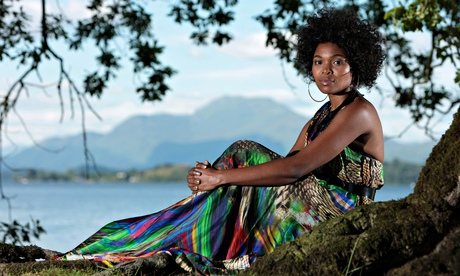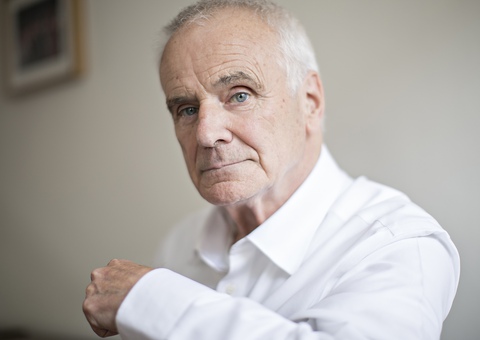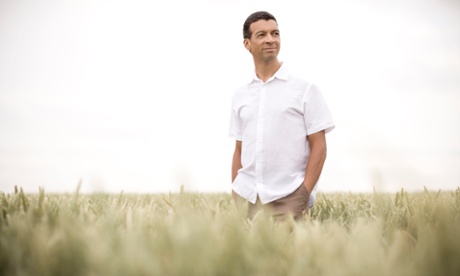Pumeza Matshikiza discovered opera as a teenager quite by accident. One day, she was switching between radio stations, and stumbled on the great Swiss soprano Edith Mathis, singing in The Marriage of Figaro. She was spellbound.
Music lessons were, however, beyond the reach of a Xhosa child born in a township on South Africa's Eastern Cape – especially in the last years of apartheid. But, as Matshikiza says, "you develop other means". A quick student, she learned African and European music by ear while singing in church choirs.
Moving from township to township with her mother, in pursuit of a safer, quieter life, she had no expectation that her voice would one day be her fortune, and she did not hear herself on tape until her 20s, when she was studying at the University of Cape Town. Was she shocked? "Yes. I still don't expect people to like it, but they do. I hear so many mistakes."
Matshikiza's career would have been unthinkable two decades ago. Today, she is part of a new generation of black South African opera singers. Small and self-contained, she cuts a glamorous figure, not least on the cover of Voice of Hope, her debut recording for Decca. With its mix of Mozart and Puccini arias, smartly orchestrated Xhosa, Swahili and Zulu songs, and the anthem she performed to an audience of a billion in the Commonwealth Games opening ceremony last week, the album is aimed squarely at a crossover audience.
Matshikiza is pragmatic about the mix, pointing out that if she can bring "something a little bit different" to the market, why not? But she is frank about the technical challenges of finding a way of singing that is "not quite operatic", and pulls a face recalling the difficulty of working on the album while also preparing for the role of Nanetta in Verdi's Falstaff for Stuttgart Opera.
The pure, wistful voice that Matshikiza used to sing Freedom Come All Ye in Glasgow is about a quarter the size of her Puccini voice. On the album, her sound in the arias is opulent, glowing. She is reticent about her long-term ambitions, but it's difficult to imagine her following in the crossover footsteps of, say, Katherine Jenkins or Russell Watson. As to Thula Baba, Pata, Pata and the other African songs on the disc, there's both a nod to the chic fusion of jazz and calypso that was Miriam Makeba's signature style in the early 60s – and a sting behind the smile. In Iya Gaduza, an unemployed man paces alone in his house while his wife works for a white family. Even Freedom Come All Ye, written the year of the Sharpeville massacre in 1960, contains a reference to Nyanga, one of the townships where Matshikiza grew up.
At the centre of the album is South African composer Kevin Volans's Umzi Watsha. Volans met the soprano when she sang in an opera he wrote for Cape Town's Handspring Puppet Theatre (the company behind War Horse's puppets). He urged Matshikiza to audition for the British conservatoires, paying her air fare. Her first stop in London was the Royal College of Music, where she was immediately offered a full scholarship. The Royal Opera House's young artists scheme followed, with roles in The Minotaur, Don Carlo and Hänsel und Gretel. The decision to take things slowly was hers: "I don't understand what the hurry is. I want to sing as best as possible. It doesn't matter when or to whom." At Covent Garden, observation was as vital a part of the learning experience as performance and coaching. Its music director Antonio Pappano remains her model of the ideal, collaborative singers' conductor: "Talking to the soloists, he would say, 'What do you want to do here? I'll follow you', and only then would he suggest what he thinks. When you are a singer that gives you so much security, so much energy."
Now 35, Matshikiza remembers the prelude to the end of apartheid, the necklacing and riots and reprisals. Back in South Africa shooting a video for Voice of Hope in one of the townships where she once lived, she was "surprised by how some things have not moved forward at all. To undo the whole history of colonialism and apartheid in 20 years is a very hard task." Could she imagine moving back? "There are times when I think I would love to. Maybe after five, 10 years, who knows?" And is she a celebrity there? She laughs. "My mother thinks so." But despite its burgeoning reputation for producing great voices, South Africa cannot compete with Germany in terms of performing opportunities. Neither can Britain, where opera soloists are freelance rather than company employees. As part of Stuttgart Opera's full-time ensemble since 2011 (she has just extended her contract in the "small but cosmopolitan" city), Matshikiza has sung roles including Pamina, Zerlina and Nanetta.
Next month there's Dido, one of opera's earliest African roles, in Purcell's Dido and Aeneas for the Bristol Proms, which will be followed by Mimi in La Bohème in the 2014-15 season and Fiordiligi in Così fan Tutte in Stuttgart the following year. She places great trust in the company's largely female administrative and artistic team. In London, where she lived for eight years, only one production she sang in was directed by a woman (Melly Still's 2010 Zaïde). "When I came to Germany, the one thing I noticed about German women was what power they have," she says. South Africa, by contrast, is "a macho culture and the whole thing is hidden under the guise of tradition. Women have it really, really hard." Women's rights clearly matter to her but pressed further on this issue, her answer is guarded: "My ideas go with feminism but I wouldn't call myself a feminist."
With more recordings planned, a huge publicity machine behind her and a European concert tour with Rolando Villazon in the autumn, it will be interesting to see which half of Matshikiza's musical soul will win: Mozart or Makeba. Running two careers side by side, one in crossover, with its glossy photo shoots and its mainstream television appearances, and the other as a member of an ensemble company with a penchant for grunge costumes and regietheater will be quite a challenge.
• Voice of Hope is out now. Matshikiza sings Dido in the Bristol Proms on 2 August and performs at Proms in the Park, London, on 13 September.








